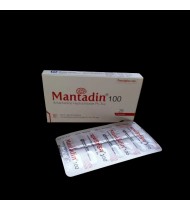Amantadine Hydrochloride
Indications
Amantadine Hydrochloride is indicated for-
- Treatment of parkinsonism
- Treatment of drug-induced extrapyramidal reactions
- Prophylaxis and treatment of signs and symptoms of infection caused by various strains of influenza A virus
Pharmacology
The mechanism by which amantadine exerts its antiviral activity is not clearly understood. It appears to mainly prevent the release of infectious viral nucleic acid into the host cell by interfering with the function of the transmembrane domain of the viral M2 protein. In certain cases, amantadine is also known to prevent virus assembly during virus replication. It does not appear to interfere with the immunogenicity of inactivated influenza A virus vaccine.
Amantadine inhibits the replication of influenza A virus isolates from each of the subtypes, i.e., H1N1, H2N2 and H3N2. It has very little or no activity against influenza B virus isolates. A quantitative relationship between the in vitrosusceptibility of influenza A virus to amantadine and the clinical response to therapy has not been established in man. Sensitivity test results, expressed as the concentration of amantadine required to inhibit by 50% the growth of virus (ED50) in tissue culture vary greatly (from 0.1 µg/mL to 25.0 µg/mL) depending upon the assay protocol used, size of virus inoculum, isolates of influenza A virus strains tested, and the cell type used. Host cells in tissue culture readily tolerated amantadine up to a concentration of 100 µg/mL.
Amantadine inhibits the replication of influenza A virus isolates from each of the subtypes, i.e., H1N1, H2N2 and H3N2. It has very little or no activity against influenza B virus isolates. A quantitative relationship between the in vitrosusceptibility of influenza A virus to amantadine and the clinical response to therapy has not been established in man. Sensitivity test results, expressed as the concentration of amantadine required to inhibit by 50% the growth of virus (ED50) in tissue culture vary greatly (from 0.1 µg/mL to 25.0 µg/mL) depending upon the assay protocol used, size of virus inoculum, isolates of influenza A virus strains tested, and the cell type used. Host cells in tissue culture readily tolerated amantadine up to a concentration of 100 µg/mL.
Dosage & Administration
Parkinson's disease:
- Adult: Initially, 100 mg/day, increased to 100 mg bid after a wk or more. Max dose: 400 mg daily.
- Elderly: >65 yr: Lowest effective dose.
- Adult: 100 mg daily for up to 6 wk; when used with influenza vaccination: only up to 3 wk after vaccination.
- Child: 10-15 yr: 100 mg daily.
- Adult: 100 mg daily for 5 days.
- Elderly: >65 yr: Daily dose of 1 day.
- Adult: 100 mg bid for 14 days, continued for another 14 days if pain persists.
Interaction
Concurrent administration of Amantadine and anticholinergic agents or levodopa may increase confusion, hallucinations, nightmares, gastro-intestinal disturbances, or other atropine-like side effects. Psychotic reactions have been observed in patients receiving Amantadine and Levodopa.
Concurrent administration of Amantadine and drugs or substances (e.g. alcohol) acting on the CNS may result in additive CNS toxicity. Close observation is recommended.
Concurrent administration of Amantadine and drugs or substances (e.g. alcohol) acting on the CNS may result in additive CNS toxicity. Close observation is recommended.
Contraindications
Amantadine is contraindicated in patients with known hypersensitivity to the active substances or to any of the excipients.
Side Effects
The adverse effects of Amantadine are generally mild and, when they occur, may diminish or cease after a week or more on the medication. The most commonly reported side effects include nausea, dizziness/ lightheadedness, and insomnia.
Other side effects may include edema of ankles, livedo reticularis; anxiety, elevation of mood, headache, lethargy, hallucinations, ataxia, slurred speech, blurred vision, loss of concentration, nervousness, depression, myalgia, palpitations, orthostatic hypotension, dry mouth, anorexia, constipation and diaphoresis.
Other side effects may include edema of ankles, livedo reticularis; anxiety, elevation of mood, headache, lethargy, hallucinations, ataxia, slurred speech, blurred vision, loss of concentration, nervousness, depression, myalgia, palpitations, orthostatic hypotension, dry mouth, anorexia, constipation and diaphoresis.
Pregnancy & Lactation
Pregnancy category C. No well-controlled studies have been done in pregnant women to evaluate Amantadine's safety. Amantadine may be used during pregnancy when the potential benefits outweigh the potential but unknown risks to the fetus.
Amantadine is excreted into breast milk in low concentrations. As no information is available on the effects in infants, therefore amantadine should be used cautiously in women who are breastfeeding.
Amantadine is excreted into breast milk in low concentrations. As no information is available on the effects in infants, therefore amantadine should be used cautiously in women who are breastfeeding.
Precautions & Warnings
Amantadine should not be discontinued abruptly in patients with Parkinson's disease since a few patients have experienced a parkinsonian crisis, i.e., a sudden marked clinical deterioration, when this medication was suddenly stopped. The dose of anticholinergic drugs or of Amantadine Hydrochloride should be reduced if atropine-like effects appear when these drugs are used concurrently. Abrupt discontinuation may also precipitate delirium, agitation, delusions, hallucinations, paranoid reaction, stupor, anxiety, depression and slurred speech.
Use in Special Populations
Patients with renal impairment: The dose should be reduced. This can be achieved by either reducing the total daily dose, or by increasing the dosage interval in accordance with the creatinine clearance. For example:
- CrCl <15 ml/min: Contraindicated
- CrCl 15-35 ml/min: 100 mg every 2 to 3 days
- CrCl >35 ml/min: 100mg every day
Therapeutic Class
Respiratory viral infections (Influenza)
Storage Conditions
Store at 20-25°C in dry place. Protect from light.
Mantadin Capsule 100 mg
IndicationsAmantadine Hydrochloride is indicated for-Treatment of parkinsonismTreatment of drug-indu..
10.00Tk.
Showing 1 to 1 of 1 (1 Pages)

